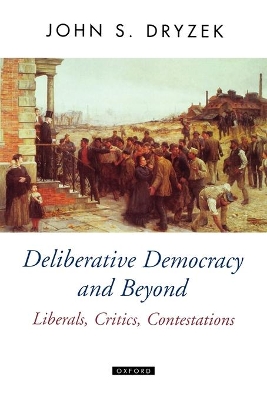Oxford Political Theory
1 total work
The past few years have seen a remarkable ferment in the theory of democracy. Deliberative Democracy and Beyond is a critical tour through recent democratic theory by one of the leading political theorist in the field. It examines the deliberative turn in democratic theory, which argued that the essence of democratic legitimacy is to be found in authentic deliberations on the part of those affected by a collective decision.
The deliberative turn began as a challenge to established institutions and models of democracy, but it has now been largely assimilated by these same institutions and models. Drawing a distinction between liberal constitutionalist deliberative democracy and discursive democracy, the author criticizes the former and advocates the latter. He argues that a defensible theory of democracy should be critical of established power, pluralistic, reflexive in its questioning orientation to established
traditions, transnational in its capacity to extend across state boundaries, ecological, and dynamic in its openness to ever-changing constraints upon and opportunities for democratization. Dryzek's reinvigorated approach enables deliberative democracy to respond more effectively to the criticisms that
have been leveled against it.
Oxford Political Theory presents the best new work in contemporary political theory. It is intended to be broad in scope, including original contributions to political philosophy, and also work in applied political theory. The series will contain works of outstanding quality with no restrictions as to approach subject matter.
Series Editors: Will Kymlicka, David Miller, and Alan Ryan
The deliberative turn began as a challenge to established institutions and models of democracy, but it has now been largely assimilated by these same institutions and models. Drawing a distinction between liberal constitutionalist deliberative democracy and discursive democracy, the author criticizes the former and advocates the latter. He argues that a defensible theory of democracy should be critical of established power, pluralistic, reflexive in its questioning orientation to established
traditions, transnational in its capacity to extend across state boundaries, ecological, and dynamic in its openness to ever-changing constraints upon and opportunities for democratization. Dryzek's reinvigorated approach enables deliberative democracy to respond more effectively to the criticisms that
have been leveled against it.
Oxford Political Theory presents the best new work in contemporary political theory. It is intended to be broad in scope, including original contributions to political philosophy, and also work in applied political theory. The series will contain works of outstanding quality with no restrictions as to approach subject matter.
Series Editors: Will Kymlicka, David Miller, and Alan Ryan
